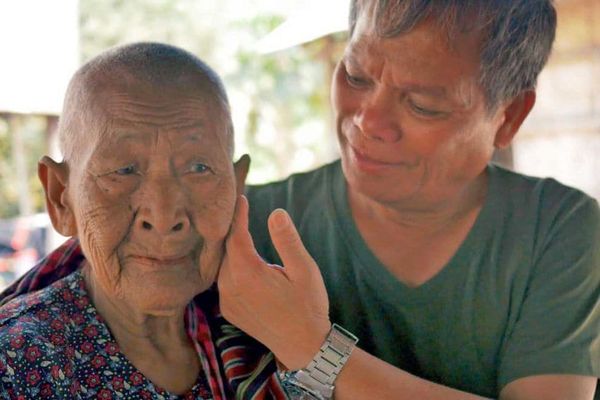Eye For Film >> Movies >> Angkar (2018) Film Review
Angkar
Reviewed by: Sunil Chauhan

Its bold, bright titles might recall early Gaspar Noé but French-Cambodian director Neary Adeline Hay’s Angkar is a subtler proposition, if no less shocking. Echoing Patricio Guzman’s Nostalgia For The Light and Anocha Suwichakornpong’s By The Time It Gets Dark, this is a meditative yet piercing documentary about historical atrocities revisited through individual testimony.
A searching visitation of the Khmer Rouge regime that ruled Cambodia during the years of 1974 and 1979, Hay goes with her father Khonsaly as he returns to the site of state-administered horrors that he has rarely spoken of in the intervening years. Hay follows his reflections with her own response, a technique that could become solipsistic, but instead makes Angkar not just an intimate excavation of Cambodian history, but a film about the scarred puzzles of family histories, becoming an exploration of how memories are often not passed down from one generation to the next like heirlooms, but locked away, never to be spoken of again.

Angkar – translated as The Organisation, the name for the Khmer Rouge – is a sensitive, personal documentary, but one that keeps a universal experience in its peripheral vision. As Khonsaly returns to the village of Ta Saeng where his family were murdered by agents of the Khmer Rouge, the trip becomes one of attempted reconciliation, with Khonsaly meeting former perpetrators who have since slipped into normal society, facing little in the way of reproach. “They are all still alive, it’s disgusting,” he says upon discovering that one is now a village deputy head.
But if news of his tormentors’ survival provokes bitter disbelief, his meetings with them produce curious responses. One former spy plays victim: “I was a spy only for one year. And it was hard.” Their complacency provokes fury in the viewer, yet it is difficult to expect more as Khonsaly searches for answers - simply facing them is likely trying enough. While it’s probably a stretch to say that these meetings seek to humanise the perpetrators, suggesting that perhaps they too were simply trying to survive in a new dog-eat-dog order – your trust inevitably lies with Khonsaly more than any of his oppressors – these sequences show his attempt to find some form of reconciliation with the agonies of the past.
As Khonsaly stirs up memories he has tried to keep in check the past four decades, it gives way to a broader debate on how to deal with collective trauma, whether as individuals, families or societies. Had there been more dialogue about this period in Cambodia’s history – one of the most horrific of the last century, claiming the lives of some two million during a mere four years – perhaps that would have given both survivors like Khonsaly, still grieving for those who didn’t survive as he did, and those of Hay’s generation, a starting point to discuss how their lives came to be.
Angkar is a quiet film, its eerie moments of stillness broken by harrowing, heart-breaking testimony. It’s a fitting format for a film that is filled with deep regret over the silence of shame, but one that never loses its empathy for that all-too-human reticence to revisit pains of the past we would rather leave untouched.
Reviewed on: 17 Sep 2018














